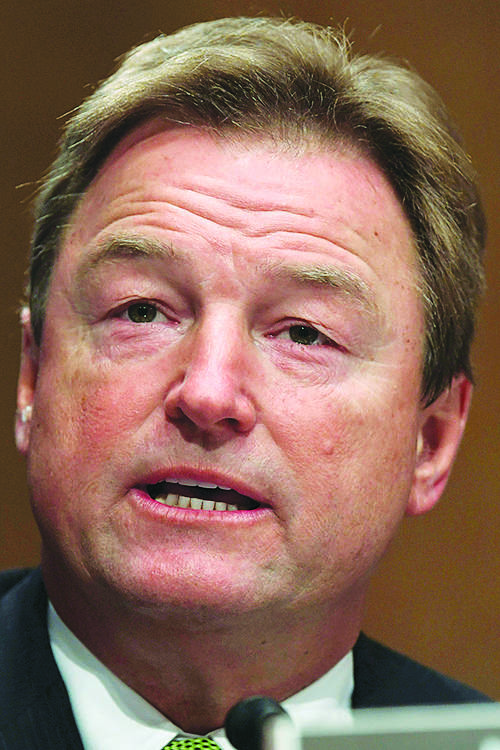Social media ads a key campaign tactic for Heller, Rosen
Nevada’s U.S. Senate candidates are bankrolling hundreds of Facebook ads tailored to reach voters based on their age, sex and location — an approach campaign experts say is far more effective than traditional TV and radio ads.
With four months left until the high-profile election — which could determine who controls the U.S. Senate — Republican Sen. Dean Heller and Democrat U.S. Rep. Jacky Rosen are flooding the social media site with ads targeting undecided voters.
Facebook now discloses the cost of political ads, who paid for them and the audiences reached as part of a new policy to crack down on misinformation and interference in U.S. elections.
A review of Facebook ads showed Rosen’s campaign far outpaced Heller’s in using the site to spread her message. As of Friday, the “Jacky Rosen for Nevada” page has run 350 ads since May 7, while Heller’s Senate campaign has paid for 220 ads. The Rosen campaign bought 130 Facebook ads this month alone — nearly double that of Heller’s 76.
Kris Cichoski, director of social publishing at R&R Partners, a Las Vegas-based public affairs firm, said he anticipates more nuanced, individualized Facebook ads from the candidates.
“Although the message in general might be the same, they know what might resonate with certain audiences over others,” Cichoski said, adding that the tailored campaign messages are more effective than general ads.
Different tactics
When it comes to their social media strategy, the candidates differ nearly as much as their policies.
Heller’s most recent Facebook ads targeted voters who are 65 or older, according to the site’s archive, with most of the ads costing $499 or less. But that demographic — which include Review-Journal reader panel members Jim Sida, 68, and Howard Galin, 71 — is not especially active on Facebook.
Fellow panelist William Harrison, 74, is on Facebook but said he “mutes” political ads.
“I look more at what these politicians actually do, not what people say about them,” he said.
Recent Rosen ads were consumed by women 18 to 34 years old and cost under $100 each, according to Facebook’s archive, which tracks political ads for seven years.
“Social media platforms like Facebook help us meet many Nevada voters where they are and communicate our message about Jacky’s commonsense values,” said Rosen campaign spokeswoman Molly Forgey. “Digital ads are going to be an increasingly critical part of our strategy moving forward and they will complement more traditional ads from our campaign running on TV, radio, and in print between now and November.”
Both candidates generally targeted Facebook users in Nevada, the data shows, though some of Rosen’s early ad audiences were in California, Florida and New York. The campaign said the outside push was to raise campaign cash.
“While Jacky Rosen spends her money trying to woo California liberals, we campaign in Nevada,” said Heller campaign spokesman Keith Schipper. “Our time and resources are spent talking to Nevadans about the issues they care about, like supporting our veterans and lowering taxes, and sharing how Dean Heller fights and delivers for them.”
The content of the ads fall along party lines: A recent Rosen ad accused Heller of being a “rubber stamp” for President Donald Trump and his “racist” immigration policies, including the border wall. One of Heller’s July ads chided Rosen for campaigning with Jane Fonda, saying it was “disrespectful” to Vietnam War veterans.
Rosen has spent six figures on digital ads on Facebook, Twitter and Google. Heller’s campaign would not say how much it has spent on social media ads.
A large number of Facebook ads attempting to sway the Senate race are from special interest groups. ClearPath Action, a conservative clean energy group, paid for 54 ads supporting Heller while the Senate Majority PAC — a group dedicated to building a Demoratic majority — bankrolled 45 ads attacking “Dishonest Dean Heller” for votes to repeal the Affordable Care Act and defund Planned Parenthood.
Similarly, the Democratic Senatorial Campaign Committee sponsored 11 Facebook ads supporting Rosen, while its GOP counterpart, the National Republican Senatorial Committee, bought at least one ad echoing President Donald Trump’s claims that a vote for Rosen would result in tax hikes and “weak borders.”
Sites start crackdown
Facebook this year launched policies that require advertisers to verify their identities and to include “paid for by” labels on electoral or issues ads. The changes were in response to increased scrutiny following revelations that a Russian propaganda operation bought 3,500 Facebook ads during the 2016 presidential election.
“We know we were slow to pick-up foreign interference in the 2016 U.S. elections,” Facebook executives Rob Goldman and Alex Himel wrote in an April anouncement. “Today’s updates are designed to prevent future abuse in elections — and to help ensure you have the information that you need to assess political and issue ads, as well as content on Pages.”
Other social media websites followed suit by cracking down on fake accounts.
Twitter shut down more than 70 million accounts since May to purge bots and trolls that spread misinformation. An account attacking Heller called “Senator Spineless” — a common moniker used by the Rosen campaign — was suspended and then reactivated later in the week. Other accounts attacking Nevada politicians, including gubernatorial candidates Steve Sisolak and Adam Laxalt, also remain active.
Contact Ramona Giwargis at rgiwargis@reviewjournal.com or 702-380-4538. Follow @RamonaGiwargis on Twitter.


















